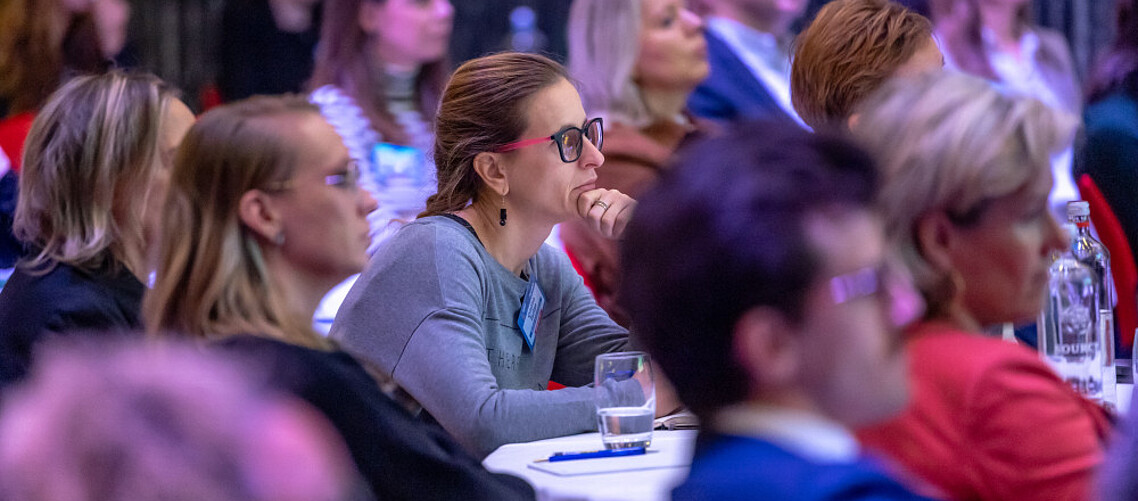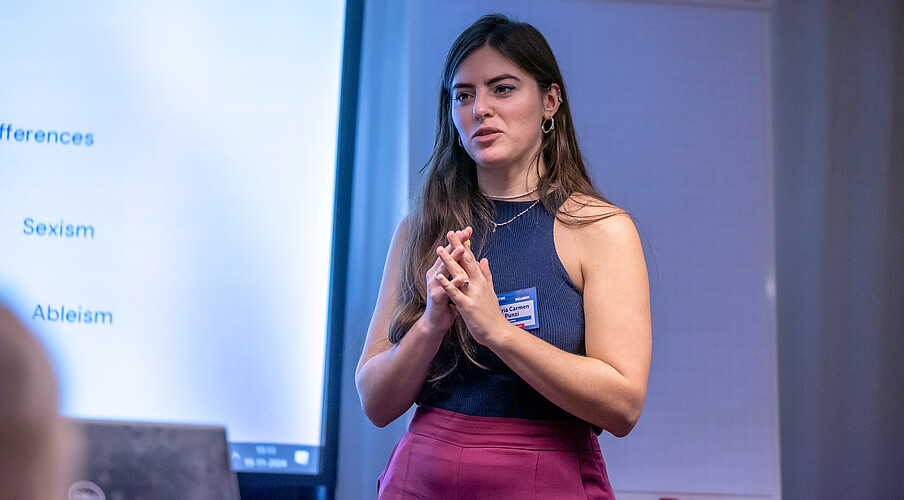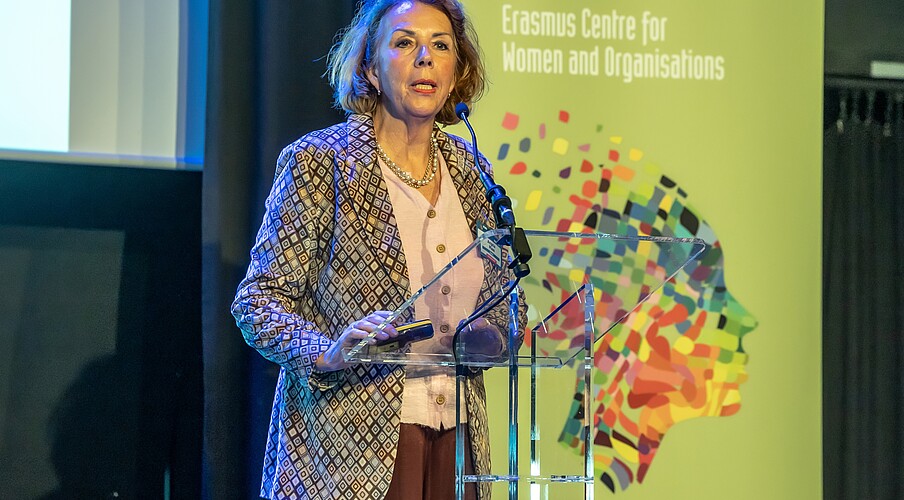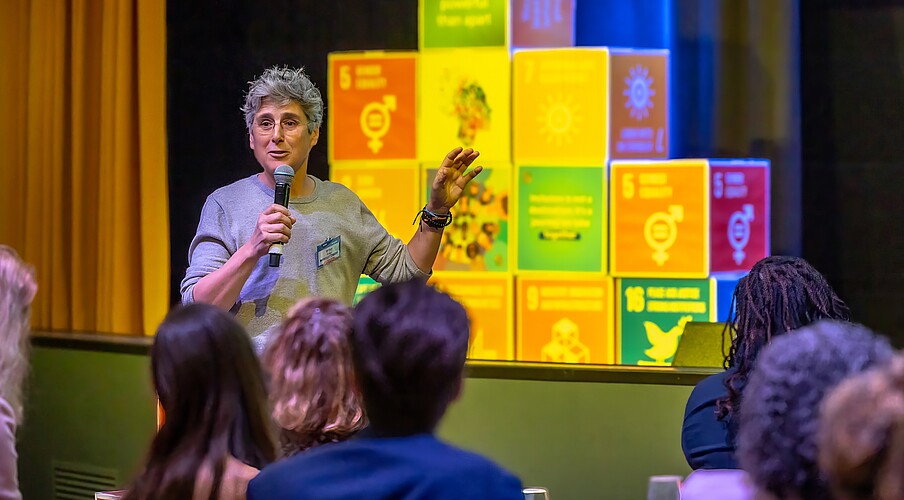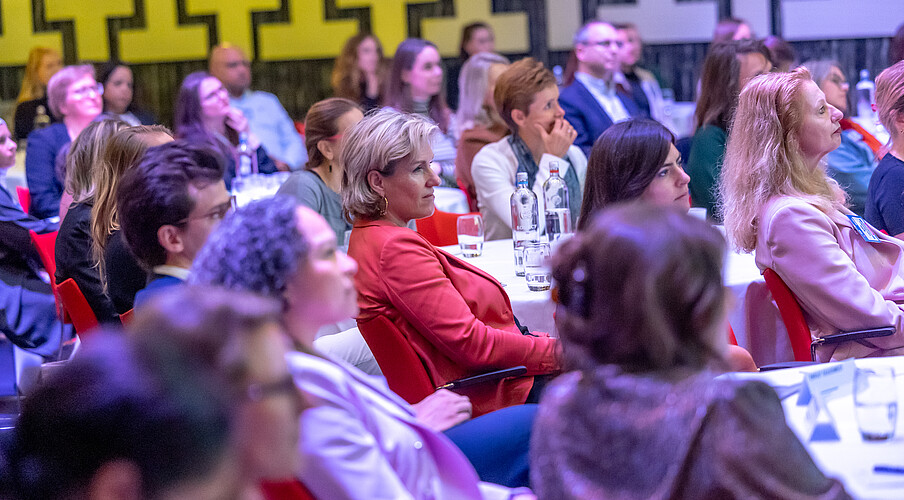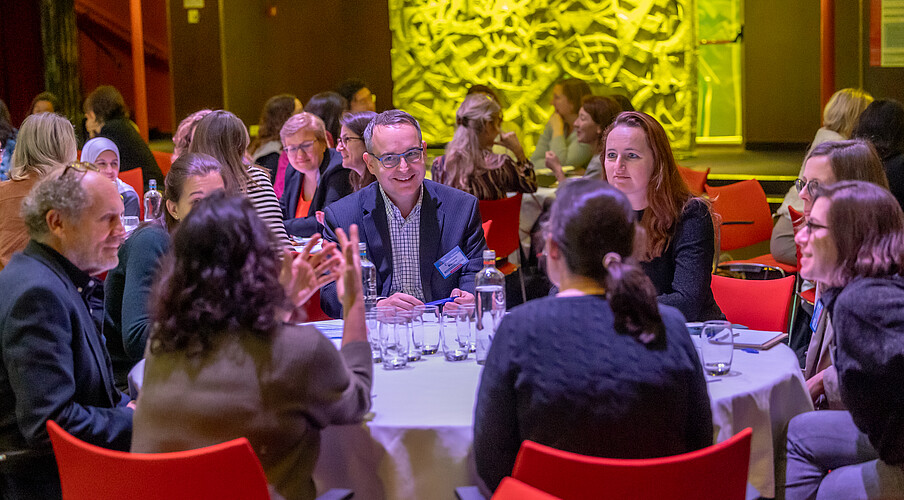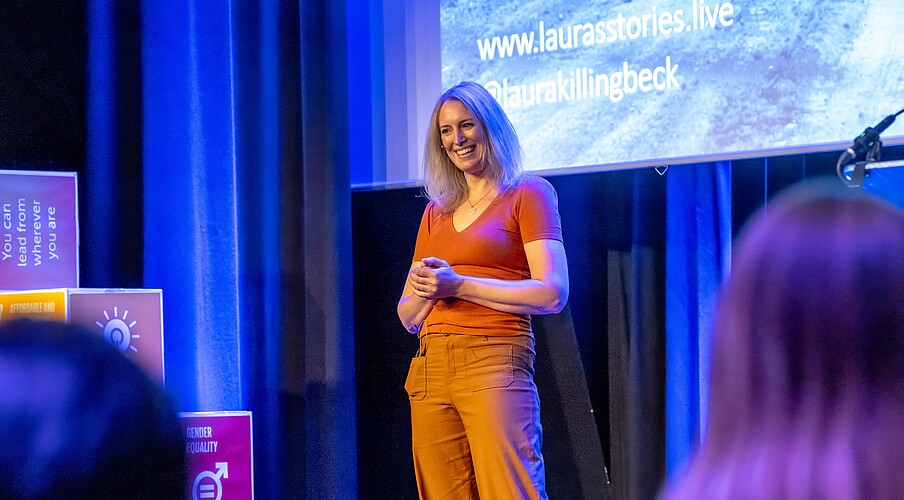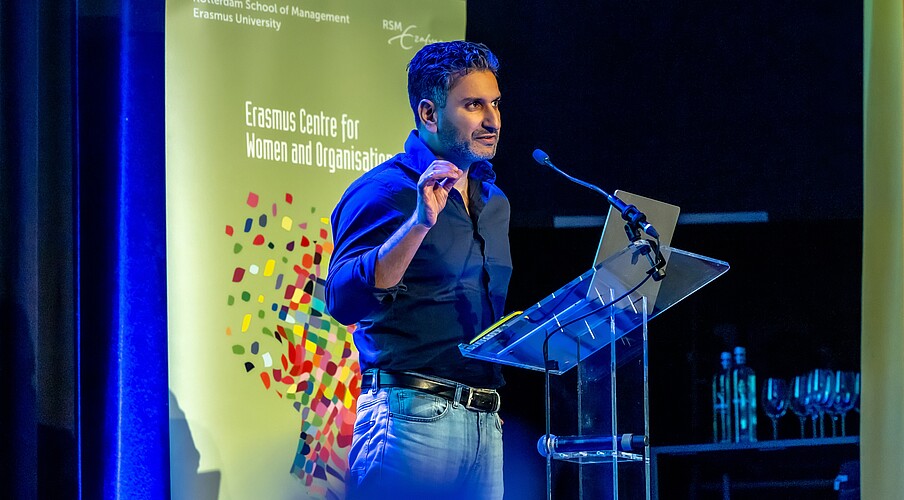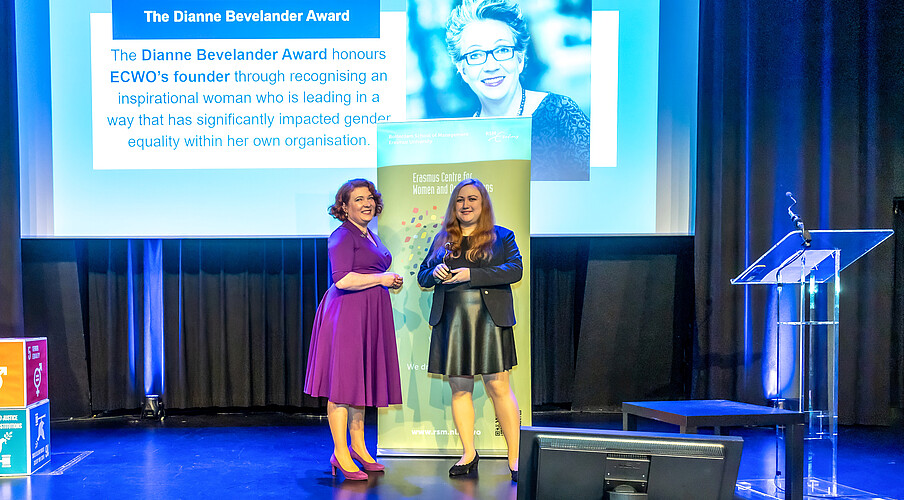The conference was shaped around pathways to inclusion, from the perspective of individuals and organisations, as well as the socio-economic viewpoint. In the introduction by ECWO’s executive director Professor Hanneke Takkenberg and assistant director Dorothy Grandia, it became apparent that inclusiveness lacks in many fields. “When it comes to big challenges like SDGs, they are all interconnected. Women suffer more from these inequalities than men – whether it comes to energy poverty or access to healthcare. That’s why it should be high on the agenda. Women are part of the solution so we should push female leadership,” said Professor Takkenberg.
Gendered assumptions
Keynote speaker Laura Killingbeck – whose adventures, work and writing focuses on sustainability, regenerative food systems, and intentional living – reflected on how the body functions as a thinking, sensing entity, processing information beyond the conscious mind. She then shifted to discuss patriarchy, a system rooted in the belief that gender roles are biologically determined, with men in power and women in caregiving roles.
Killingbeck, who wrote the brilliant reflection on the ‘man or bear’ debate, critiqued the harmful effects of patriarchy and societal fears, including gender-based violence, toxic masculinity, and the emotional toll on men, such as high suicide rates and strained relationships. While patriarchy centres power, it also perpetuates a fracturing of human wholeness. Killingbeck argues that masculine and feminine traits are human qualities, and when society embraces a more integrated view of gender, centred on mutual safety and connection, cultural change becomes possible. “Women are people. Men are people. People are complex, and motivated by connection and safety. If we keep saying men are ‘wrong’ or there’s something wrong with them, then that will become internalised. You don’t want that situation,” she told the audience.
Through personal anecdotes of solo travel and community-building, Killingbeck challenged gendered assumptions and advocates for reclaiming all human traits. Her work calls for dismantling oppressive systems and integrating ‘masculine’ and ‘feminine’ traits within individuals to foster mutual safety and connection. “Sexism is believed to be an ideology that this division is permanent. Patriarchal behaviour has everything to do with men, and at the same time nothing at all. The understanding that patriarchy exists now is not the same as the belief that it must exist in the future. It’s a shared path, and it’s a hopeful one,” she said.
Systemic changes in healthcare
Dr Hafez Ismaili M’hamdi, an associate professor of medical ethics from Maastricht University, shared his vision for what inclusive healthcare should look like, and what it will take to get us there. He highlighted significant health inequalities in the Netherlands, where affluent individuals experience far better health outcomes than those from underprivileged backgrounds.
These disparities are often rooted in social conditions rather than the quality of healthcare itself. Dr M'hamdi emphasises that health and well-being are deeply influenced by socio-economic factors and intergenerational conditions, underlining the need for social equity to address these issues. He argued that inclusion is vital not just to address health disparities but also to ensure diverse representation in healthcare. This representation is crucial for identity formation, as people need to see aspects of themselves reflected in society to envision their own potential.
Dr M'hamdi advocates for systemic changes to ensure healthcare professionals are diverse and that everyone, regardless of background, has equal opportunities to thrive. He stresses that inclusion must be felt emotionally, not just rationally, to drive meaningful change. “We must represent those who can’t represent themselves, because that’s part of inclusion. The lack of inclusion is detrimental to our health and to the capacity to deliver healthcare. It’s a manifestation of a more general crisis of basic human respect that plagues many parts of the world. We need allies of affective commitment. The values health, wellbeing and happiness are owed to all of us, whoever and wherever you are,” he concluded.
Fostering mutual understanding
The conference continued with a guided interactive dialogue among participants, led by Professor Wiley Davi, about what we can learn from each other about the imperatives for creating inclusive environments as leaders and as colleagues. Their presentation focused on fostering inclusivity by encouraging authenticity and embracing discomfort, highlighting the energy people waste hiding parts of themselves and emphasised creating spaces where individuals can fully be themselves.
Through storytelling and group discussions, participants reflected on moments of inclusion and exclusion, exploring the complexities of belonging and the interplay of connection and discomfort. Prof. Davi stressed that small wins, such as building connections and fostering mutual understanding, are essential steps toward systemic change.
Professor Davi encouraged participants to consider how they could drive inclusivity in their own spaces, regardless of their role, and adopt a growth mindset to overcome barriers. They underscored the importance of listening to and sharing stories as a powerful inclusive practice. They concluded by emphasising the need to embrace difficult conversations, question existing assumptions, and intentionally create moments of belonging to pave the way for meaningful, sustainable inclusivity.
Breakout sessions: inclusivity in the workplace
After the vegan lunch in the ship’s Queen’s lounge, the afternoon programme started with inspiring breakout sessions. Participants could choose two out of the seven workshops.
The breakout sessions explored diverse dimensions of workplace inclusion and its measurement. Topics included ECWO’s Inclusion Gap Instrument for addressing identity-based inclusion gaps, DEI learnings between the US and EU, and engaging allies in LGBTQ+ and women’s initiatives. Healthcare sessions highlighted designing women-centered systems, while interactive labs explored bridging organisational inclusion gaps, and discussions emphasised actionable strategies for fostering allyship. The sessions fostered insights, accountability, and practical solutions, emphasising the imperative of creating environments that ensure belonging for diverse identities and experiences.
In a session by RSM’s Maria Carmen Punzi on inclusion throughout life stages, participants came up with supportive policies, shared their own experience of hormonal health, motherhood, loss or ageing in the workplace, and dreamed up what their ideal workplace would look like when it comes to these topics.
The conference’s sponsor NN’s workshop, led by Juliette van der Laarse, chairperson NN Women in IT, and Ahmed Shafik, Head of IT Group Services at NN, covered women's visibility and voice in male-dominated work environments, highlighting the role of male allies. Participants discussed gender-biased performance evaluations and advocated for inclusive dialogue, mentoring, and ally programmes. Practical actions included formalising networks and guiding men to support women effectively.
Dianne Bevelander Prize 2024
Back in the plenary theatre, the Dianne Bevelander Prize 2024 was awarded to Georgina Lara Booth by the late Prof. Dianne Bevelander’s daughter Dr Natalie Cleton. The award recognises inspirational women who leads in a way that has significantly impacted gender equality. Dr Cleton also introduced the new Dianne Bevelander Memorial Fund, which financially supports women who want to participate in a conference or course who needs funding to make this possible. “My mother believed in the power of education. Women need these opportunities to grow within themselves and within their community,” said Dr Cleton.
Women’s health gap
In the day’s final presentation, Professor Angela Maas highlighted the critical women’s health gap, particularly in cardiology, emphasizing the urgent need for structural reforms in medical systems. Reflecting on her journey as founder of the Hart voor Vrouwen foundation at the Radboud University Medical Center, Maas recounted how women’s symptoms were dismissed in the 1980s due to male-centric medical models. A transformative moment in 1991, when a female patient demanded better answers, inspired her to challenge ingrained biases. “She woke me up,” Maas said, underscoring the importance of listening to patients.
Maas critiqued medicine’s male dominance, tracing misconceptions back to ancient views of female inferiority. Even modern practices often favor male-oriented research, with women making up just 20-25% of coronary artery disease studies. She noted that medical guidelines, historically developed by male committees, ignored gender differences until recent reforms. “Now the guidelines have changed,” she acknowledged, crediting the inclusion of women in leadership roles.
Re-wire male culture in medicine
Highlighting disparities like underdiagnosed cardiovascular risks linked to pregnancy complications or menopause, Prof. Maas called for mandatory education on sex and gender differences. “We must rebuild medicine to serve all equally,” she asserted.
Maas concluded with actionable steps to ‘re-wire’ male culture in medicine, including interdisciplinary collaboration, diverse leadership, and inclusive education, aiming to create an equitable healthcare system prioritizing all patients. Professor Maas’ new book De Gezondheidskloof will be released this month.
The conference concluded with ECWO’s Dorothy Grandia saying: “We don’t want to end these discussions today, we want to begin it. See it as open invitation to reach out and continue the conversation. We can take a collaborative approach, and make the transition to create inclusive organisations.”
